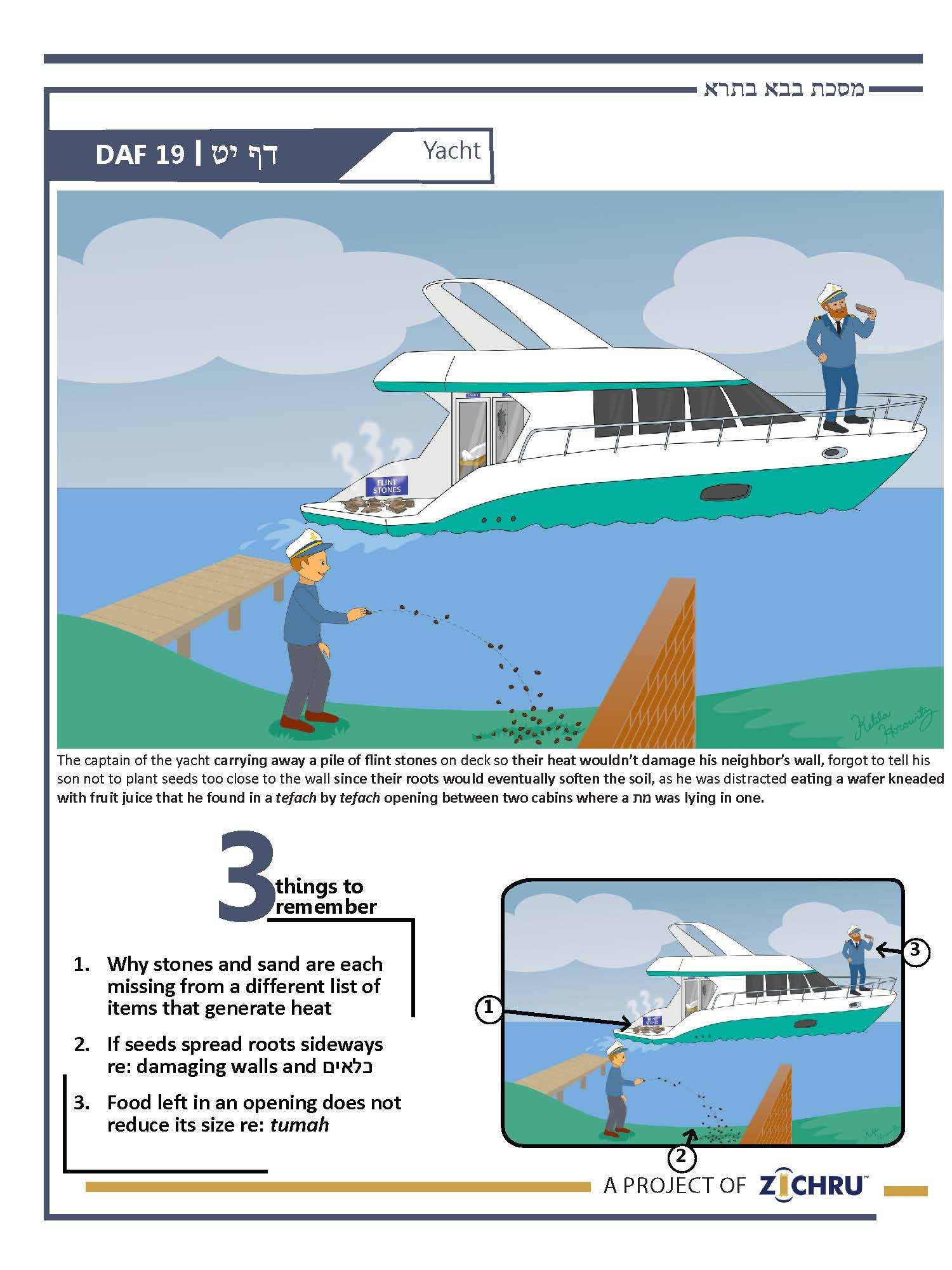Bava Basra - Daf 19
- Audio Timestamps
0:00 - The 3 Sugyos
2:44 - Review of 3 Sugyos
5:21- Siman
7:41 - 4 Blatt Back Chazarah
14:48 - Pop Quiz (Last 7 blatt)
For access to all Zichru resources including PDFs, and illustrations CLICK HERE
- Why stones and sand are each missing from a different list of items that generate heat
The Mishnah on Daf 17a listed סלעים – flint stones among materials that must be distanced from a neighbor’s wall, because the heat they generate damages it. Here, a Mishnah is quoted regarding wrapping food before Shabbos: אין טומנין לא בגפת ולא בזבל ולא במלח ולא בסיד ולא בחול – one may not wrap food with olive refuse, manure, salt, lime, or sand, whether they are wet or dry. This is because they generate heat and may lead someone to wrap food in burning coals (which may in turn lead to stoking them). The Gemara wonders why our Mishnah mentions stones, but not sand, and the Mishnah in Shabbos mentions sand, but not stones!? Rava ultimately answers that the Mishnah in Shabbos does not mention stones, משום דמשתכי לה לקדרה – because they break the pot and are never used for wrapping. Our Mishnah does not mention sand, משום דמחמימי חיים ומקרירי קריר – because [sand] only heats hot items, and keeps cool items which are cold. Therefore, sand would not damage a wall. Rebbe Oshaya, who does list sand in a Baraisa, refers to wet sand, which damages through moisture.
- If seeds spread roots sideways re: damaging walls and כלאים
The Mishnah taught that seeds must be distanced three tefachim from a neighbor’s wall. Although one would normally have to distance his planting from his neighbor’s wall anyway, both because of the plowing and because of the constant watering, the Mishnah’s ruling is necessary for one planting במפולת יד – by the tossing of the hand, without furrows, in Eretz Yisroel, which relies on rainwater.
The Gemara asks: למימרא דזרעים לצדדין קא משתרשי – Is this to say that seeds spread their roots sideways, and that is why seeds must be distanced from a neighbor’s wall? But a Baraisa teaches, regarding כלאים of a vineyard, that if one bent a vine into the ground, and it is within three tefachim of the surface (so he cannot plant directly above the vine), זורע את הצדדין אילך ואילך – he may plant seeds on either side of it, because the roots only grow directly downwards!? Rebbe Yose answers that the reason for planting away from a wall is for a different reason altogether: מפני שמחלידין את הקרקע ומעלין עפר תיחוח – because [the roots] break up the soil and cause soft earth to rise to the surface.
- Food left in an opening does not reduce its size re: tumah
The Gemara discusses items left in an opening which is a tefach by a tefach between two rooms under one roof. If the item would halachically reduce the size of the opening, tumah of a מת in one room would not spread to the second room. Shmuel said: רקיק אינו ממעט בחלון – A wafer left in an opening does not reduce the size of the opening, since it is likely to be removed to be eaten. Therefore, tumah would spread through the opening. The Gemara asks that even without Shmuel’s ruling, the wafer should not stop the spread of tumah, because food is ordinarily מקבל טומאה – susceptible to tumah, וכל דבר שהוא מקבל טומאה אינו חוצץ בפני הטומאה – and any item susceptible to tumah does not block tumah from spreading!? The Gemara answers: שנילש במי פירות – the case is a wafer which was kneaded with fruit juice, not water. Since it did not come in contact with water (or any of the seven liquids which render food vulnerable to tumah), the wafer itself is impervious to tumah.
Siman – Yacht
The captain of the yacht carrying away a pile of flint stones on deck so their heat wouldn’t damage his neighbor’s wall, forgot to tell his son not to plant seeds too close to the wall since their roots would eventually soften the soil, as he was distracted eating a wafer kneaded with fruit juice that he found in a tefach by tefach opening between two cabins where a מת was lying in one.


